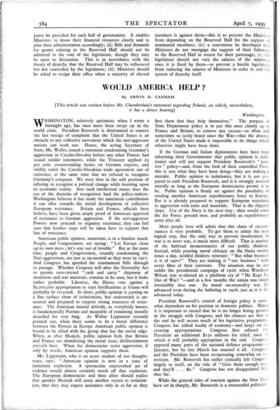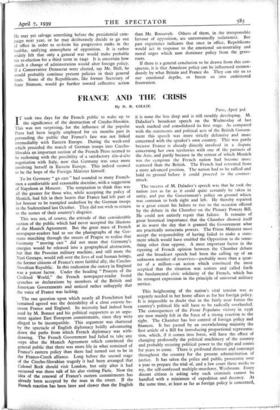WOULD AMERICA HELP ?
By ERWIN D. CANHAM
[This article was written before Mr. Chamberlain's statement regarding Poland, on which, nevertheless, it has a direct bearing] .
Washington.
WASHINGTON, relatively optimistic when I wrote a fortnight ago, has once more been swept up in the world crisis. President Roosevelt is determined to remove the last vestige of complaint that the United States is an obstacle to any collective movement which the anti-aggressor nations can work out. Hence, the acting Secretary of State, Mr. Welles, issued a statement condemning Germany's aggression in Czecho-Slovakia before any other Powers had issued similar statements, while the Treasury applied 25 per cent. countervailing duties on German exports, and swiftly ruled the Czecho-Slovakian trade agreement out of existence, at the same time that we refused to recognise Germany's conquest. We were thus in the odd position of refusing to recognise a political change while insisting upon its economic reality. Into such intellectual mazes does the use of the doctrine of recognition lead the policy-makers. Washington believes it has made the maximum contribution it can offer towards the initial development of collective European resistance. Britain and France, officials here believe, have been given ample proof of American approval of resistance to German aggression. If the anti-aggressor Powers now proceed to organise resistance, they can feel sure that further steps will be taken here to support that line of resistance.
American public opinion, meantime, is in a familiar mood. People, and Congressmen, are saying: " Let Europe clean up its own mess ; let's stay out of trouble." But at the same time, people and Congressmen, roundly condemning the Nazi aggressions, are just as un-neutral as they were in 1917. And Congress has speeded the rearmament Bills through to passage. Whether Congress will alter the Neutrality Act to permit unrestricted " cash and carry " shipment of munitions and war materials, remains to be seen, but it looks rather probable. Likewise, the House vote against a $5,000,000 appropriation to start fortifications at Guam will probably be reversed. In short, public opinion is putting on a fine surface show of isolationism, but underneath is un- neutral and prepared to support strong measures of resist- ance. The American mental attitude, as everybody knows, is fundamentally Puritan and incapable of remaining morally detached for very long. As Walter Lippmann recently pointed out, when there seems to be a moral difference between the Powers in Europe American public opinion is bound to be allied with the group that has the moral edge. When, as after Munich, public opinion feels that Britain and France are abandoning the moral issue, disillusionment prevails here. When the democracies resist aggression, if only by words, American opinion supports them.
Mr. Lippmann, who is an acute student of our thought- ways, says : " American opinion is now in a state of imminent explosion. A spectacular unprovoked act of violence would almost certainly touch off that explosion. The European democracies and their allies should realise that another Munich will cause another return to isolation- ism, that they may expect assistance only in so far as they first show that they help themselves." The purpose of State Department policy is to put this onus clearly up to France and Britain, to remove any excuse—so often and sometimes so justly heard since the War—that the absence of the United States made it impossible to do things which otherwise might have been done.
If the German and Italian diplomatists here have been informing their Governments that public opinion is isola- tionist and will not support President Roosevelt's " posi- tive " policy—and, from the look of their controlled Press, this is just what they have been doing—they are making a mistake. Public opinion is isolationist, but it is not pre- pared to curb President Roosevelt, and it is strongly aroused morally as long as the European democracies permit it to be. Public opinion is firmly set against the possibility of sending another American expeditionary force to Europe. But it is already prepared to support European resistance to aggression with arms and materials. That is the slippery slope. Use of the Navy is the next step ; then would come the Air Force, ground men, and probably an expeditionary army after all.
Most people here will admit that this chain of circum- stances is very probable. To get them to admit the next logical step, that the only way to prevent involvement in war is to avert war, is much more difficult. That is another of the habitual inconsistencies of our public thinking. Instead, while pouring moral obloquy on the Nazis twenty times a day, wishful thinkers reiterate : " But what business is it of ours?" They are making it " our business " with every fibre of their emotions. The situation may be not unlike the presidential campaign of 1916, when Woodrow Wilson was re-elected on a platform cry of " He Kept Us Out of War! "—and in a few months the nation was swept irresistibly into war. Its moral un-neutrality was far advanced even during the balloting in 1916, just as it is far advanced today.
President Roosevelt's control of foreign policy is some- what dependent on his position in domestic politics. Hence it is important to record that he is no longer losing ground in the struggle with Congress, and the chances are that in the end he will secure much of his legislative programme. Congress has talked loudly of economy—and keeps on in- creasing appropriations. Congress first refused the President an additional $15o millions for relief, most ^i which it will probably appropriate in the end. Congress opposed many parts of the national defence programme in January, but by late March has enacted it all. Congress and the President have been co-operating somewhat on tat revision. Mr. Roosevelt has rather cynically left Congress largely to itself, on the rule of " Give them enough rope and they'll . . . &c." Congress has not disappointed him thus far.
While the general tides of reaction against the New Deal have set in sharply, Mr. Roosevelt is a resourceful politician. He may yet salvage something before the presidential cam- paign next year, or he may deliberately decide to go out of office in order to re-form his progressive ranks in the healthy, unifying atmosphere of opposition. It is rather widely felt that only a general war would make probable his re-election for a third term in 1940 It is uncertain how much a change of adminstration would alter foreign policy. If a Conservative Democrat were elected, say Mr. Hull, he would probably continue present policies in their general lines. Some of the Republicans, like former Secretary of State Stimson, would go further toward collective action than Mr. Roosevelt. Others of them, in the irresponsible fervour of opposition, are unrestrainedly isolationist. But past experience indicates that once in office, Republicans would act in response to the emotional un-neutrality and moral urges which now dominate policy from the grass- roots.
If there is a general conclusion to be drawn from this con- spectus, it is that American policy can be influenced tremen- dously by what Britain and France do. They can stir us to our emotional depths, or freeze us into embittered frustration.











































 Previous page
Previous page